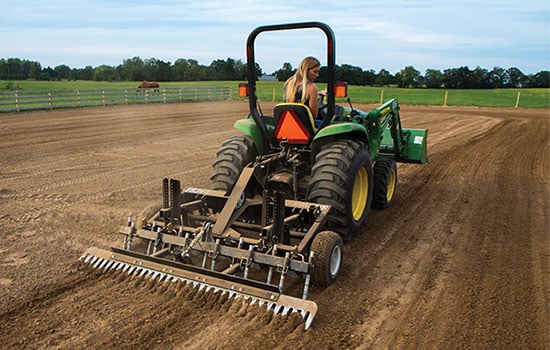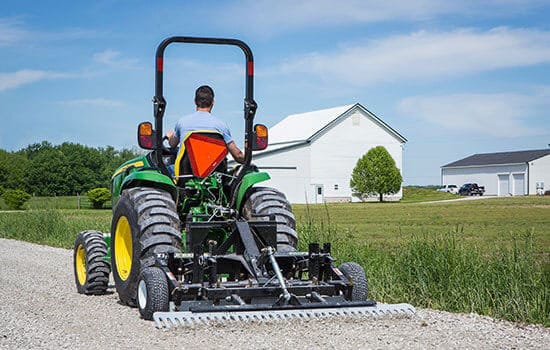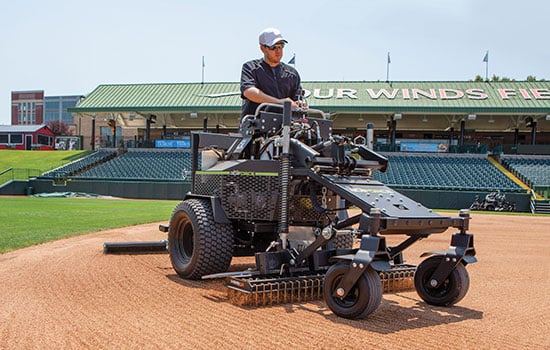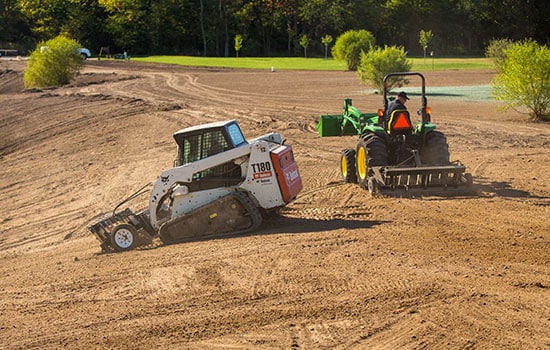Stoney Ridge Farmer – ABI Manure Spreader
Transcript
Hi, everyone. Matt here with ABI Attachments here with my new friend Josh, the Stony Ridge Farmer. Some of you may recognize him and his smile from his YouTube channel, Stony Ridge. Farmer. Josh has been on this beautiful property in the foothills of the Blue Ridge Mountains, here in North Carolina for about four years now, and Josh is taking an old tobacco plantation that was run over by brush. And the soil was terrible, soaked dry by the tobacco. And he is turning it into this beautiful ranch that someday soon we’ll have a cow calf operation on it. Today was the first time you’d ever used or even seen an ABC classic spreader. What’s your first impressions? What do you think after using this today?
It’s tough. It’s tough. If I ever. If you wanted to make it a boat. We’ve been never sink. If you just welded a plate right here, you could probably put it on only ocean and it would just float forever because it’s just tough. I mean, it’s the toughest piece of equipment on the farm. I mean, honestly, if I took a sledgehammer and banged into the side of this thing, you wouldn’t be able to tell. I mean, it’s one hundred year machine is what it is or more. I think my manure spreader down. There’s probably 80 years old, 60 or 80 years old. This is probably a hundred twenty year machine. So impressive.
So, talk us through that process then, because like you said, most of this property was was just bare rocks soaked up by that by that tobacco farming. A lot of just brush, gnarly woods covering everything. So once you clear that brush away. What are your steps to get to a point where you’ve got pasture grains that can sustain a cow calf opperation?
Well, we’re still working on that. It’s a work in progress. It’s not gonna happen just like that. You can’t just plant pastures and one year later, put your cows out on it because you’re not going to have pasture for very long and I’m going to have very healthy cows. So the process goes on like the land that is in here behind us. This was all forest. It was really rocky. And we cut the timber in the forest. We took the money from the timber. We hired a bulldozer to come in here and clear out the stumps and we got rid of all the stumps and basically drilled down grass seed and poured that chemical fertilizer that we don’t want to pour on it into the ground to give it some nutrient, to get a grip, get a hold, get the grass, to get a hold on the land. And you can see the stripes from the seed drill right here. Now that we don’t have to pour the chemical fertilizer. We’ve got some biologic material in the soil. Now we are seeking out manure and we’re using our small new idea of a manure spreader. It takes like two buckets. You guys reached out to me and said, hey, we’ve got something that’s a lot better than that. We hooked up to this thing today and oh my goodness, this thing’s awesome. I’ve never seen poop fly so high.
With your 200 acre operation here with you still in the process of clearing more land, creating more pasture. You definitely needed this 85 size. And we talked how we’ve got sizes all the way down to a 25 cubic model that can be pulled behind a lawn mower that’s ground drive as opposed to your big PTO model here. So a lot of people watching, a lot of people that we’re connected to at ABI, they don’t have 200 acres, right? They’ve got 5. They’ve got 10. So talk to us a little bit about why does manure matter on on those smaller operations?
So it matters no matter how big or how small it is. It matters that you can’t make grass grow. You can’t make turf grow. You can’t make I say turf. Turf is grass. Grass is turf. Turf. Grass is pasture. You can’t make it grow without biologic material in the soil. It needs those beneficial microbes that come from the manure. It needs that that beneficial that bed to grow in. And it’s just like you wouldn’t make your kids sleep on the floor in your house, right? You wouldn’t put your newborn on the floor in the house. So why would you put fertilizer on rock and expect grass to grow healthily? It wont grow healthy like that. You’ve got to put some biologic material back in. And that’s what we want. We want the carbon and we want the nitrogen, all the good microbes that come from the manure.
We appreciate your time. We appreciate you trying out the ABI classic spreader for us. So if you’ve never seen anything that Josh has produced. Head over to Stoney Ridge Farmer. Look him up. He’s got a lot of great resources for people trying to take care of the soil, take care of the ground, check him out. It’s been a pleasure working with him. Until next time, take care.



